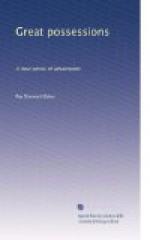It is a strange and yet familiar experience how all things present their opposites. Do you enjoy the winter? Your neighbour loathes or fears it. Do you enjoy life? To your friend it is a sorrow and a heaviness. Even to you it is not always alike. Though the world itself is the same to-day as it was yesterday and will be to-morrow—the same snowy fields and polar hills, the same wintry stars, the same infinitely alluring variety of people—yet to-day you, that were a god, have become a grieving child.
Even at moments when we are well pleased with the earth we often have a wistful feeling that we should conceal it lest it hurt those borne down by circumstances too great or too sad for them. What is there to offer one who cannot respond gladly to the beauty of the fields, or opens his heart widely to the beckoning of friends? And we ask ourselves: Have I been tried as this man has? Would I be happy then? Have I been wrung with sorrow, worn down by ill-health, buffeted with injustice as this man has? Would I be happy then?
I saw on my walk to-day an old woman with a crossed shawl upon her breast creeping out painfully to feed her hens. She lives on a small, ill-kept farm I have known for years. She is old and poor and asthmatic, and the cold bites through her with the sharpness of knives. The path to the hen-house is a kind of via dolorosa, a terror of slipperiness and cold. She might avoid it: her son, worthless as he is, might do it for her, but she clings to it as she clings to her life. It is the last reason for staying here! But the white fields and drifted roads are never joyfully met, never desired. She spends half the summer dreading the return of winter from the severities of which she cannot escape.
Nor is it all mere poverty, though she is poor, for there are those who would help to send her away, but she will not go. She is wrapped about with Old Terrors, Ancient Tyrannies—that Terror of the Unknown which is more painful even than the Terror of the Known: those Tyrannies of Habit and of Place which so often and so ruthlessly rule the lives of the old. She clings desperately to the few people she knows ("’tis hard to die among strangers!”) and the customs she has followed all her life. Against the stark power of her tragic helplessness neither the good nor the great of the earth may prevail. This reality too....
I had a curious experience not long ago: One of those experiences which light up as in a flash some of the fundamental things of life. I met a man in the town road whom I have come to know rather more than slightly. He is a man of education and has been “well-off” in the country sense, is still, so far as I know, but he has a sardonic outlook upon life. He is discouraged about human nature. Thinks that politics are rotten, and that the prices of potatoes and bread are disgraceful. The state of the nation, and of the world, is quite beyond temperate expression. Few rays of joy seem to illuminate his pathway.




